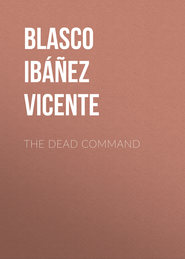По всем вопросам обращайтесь на: info@litportal.ru
(©) 2003-2024.
✖
Woman Triumphant (La Maja Desnuda)
Настройки чтения
Размер шрифта
Высота строк
Поля
"Darwin a deputy of the majority! Darwin saying 'Aye' and 'No.'"
And after these exclamations his laugh of mock astonishment continued.
"Laugh, you old bear! Open that mouth wider; wag your apostolic beard! How funny you are! And what's strange about that? But don't laugh any longer; you make me nervous. I'll go away, if you keep on like this."
They remained silent for a long while. The countess was not long in forgetting her troubles; her bird-like brain never retained any one impression for long. She looked around her with disdainful eyes, eager to mortify the painter. Was that what Renovales raved over so? Was there nothing more?
They began to walk slowly, going down to the terraced gardens behind the palace. They descended the moss-covered slopes that were streaked with the black flint of the flights of stairs.
The silence was deathlike. The water murmured as it flowed from the trunks of the trees, forming little streams that trickled down hill, almost invisible in the grass. In some shady spots there still remained piles of snow, like bundles of white wool. The shrill cries of the birds sounded like the scratching of a diamond on glass. At the edge of the stairways, the pedestals of black, crumbling stone recalled the statues and urns they had once supported. The little gardens, cut in geometric figures, stretched out the Greek square of their carpet of foliage on each level of the terrace. In the squares, the fountains spurted in pools surrounded by rusted railings, or flowed down triple layers with a ceaseless murmur. Water everywhere,—in the air, in the ground, whispering, icy, adding to the cold impression of the landscape, where the sun seemed a red blotch of color devoid of heat.
They passed under arches of vines, between huge dying trees covered to the top with winding rings of ivy that clung to the venerable trunks, veneered with a green and yellow crust. The paths were bounded on one side by the slope of the hill, from the top of which came the invisible tinkling of a bell, and where from time to time there appeared on the blue background of the sky the massive outline of a slowly moving cow. On the other, a rustic railing of branches painted white bounded the path and, beyond it, in the valley, lay the dark flower beds with their melancholy solitude and their fountains that wept day and night in an atmosphere of old age and abandon. The closely matted brambles stretched from tree to tree along the slopes. The slender cypresses, the tall pines with their straight trunks, formed a thick colonnade, a lattice through which the sunlight flitted, a false unearthly light, that striped the ground with bands of gold and bars of shadow.
The painter praised the spot enthusiastically. It was the only corner for artists that could be found in Madrid. It was there that the great Don Francisco had worked. It seemed as though at some turn in the path they would run into Goya, sitting before his easel, scowling ill-naturedly at some dainty duchess who was serving as his model.
Modern clothes seemed out of keeping with this background. Renovales declared that the correct apparel for such a landscape was a bright coat, a powdered wig, silk stockings, walking beside a Directoire gown.
The countess smiled as she listened to the painter. She looked about with great curiosity; that was not a bad walk; she guessed it was the first time she ever saw it. Very pretty! But she was not fond of the country.
To her mind the best landscape was the silks of a drawing room and, as for trees, she preferred the scenery at the Opera to the accompaniment of music.
"The country bores me, master. It makes me so sad. If you leave Nature alone to itself it is very commonplace."
They entered a little square in the center of which was a pool, on the level of the ground, with stone posts that marked where there had once been a railing. The water, swollen by the melting snow, was overflowing the stone curb, and reached out in a thin sheet as it started down hill. The countess stopped, afraid of wetting her feet. The painter went ahead, putting his feet in the driest places, taking her hand to guide her, and she followed him, laughing at the obstacle and picking up her skirts.
As they continued their way down another path, Renovales kept that soft little hand in his, feeling its warmth through the glove. She let him hold it, as if she did not notice his touch, but still with a faint expression of mischievousness on her lips and in her eyes. The master seemed undecided, embarrassed, as if he did not know how to begin.
"Always the same?" he asked weakly. "Haven't you a little charity for me to-day?"
The countess broke out in a merry laugh.
"There it comes. I was expecting it; that's why I hesitated to come. In the carriage I said to myself several times: 'My dear, you're making a mistake in going to Moncloa; you will be bored to death; you may expect declaration number one thousand.'"
Then she assumed a tone of mock indignation.
"But, master, can't you talk about anything else? Are we women condemned to be unable to talk with a man without his feeling obliged to pour out a proposal?"
Renovales protested. She might say that to other men, but not to him, for he was in love with her. He swore it; he would say it on his knees, to make her believe it. Madly in love with her! But she mimicked him grotesquely, raising one hand to her breast and laughing cruelly.
"Yes, I know, the old story. There's no use in your repeating it; I know it by heart. A volcano in my breast, impossible to live without you—if you do not love me, I will kill myself. They all say the same thing. I never saw such a lack of originality. Master, for goodness sake, do not be so commonplace! A man like you saying such things!"
Renovales was crushed by her mocking mimicry. But Concha, as if she took pity on him, hastened to add, in an affectionate tone:
"Why should you have to be in love with me? Do you think I shall esteem you less if I relieve you from an obligation that all men who surround me feel under? I like you, master; I need to see you; I should be very sorry if we quarreled. I like you as a friend; the best of all, the first. I like you because you are good; a great big boy; a bearded baby who doesn't know even the least bit about the world, but who is very, very talented. I've wanted for a long time to see you alone, to talk with you quite freely, to tell you this. I like you as I like no one else. When I am with you, I feel a confidence such as no other man inspires in me. Good friends, brother and sister, if you will. But don't put on such a gloomy face! Look pleasant, please! Give one of your laughs that cheer my soul, master!"
But the master remained sullen, looking at the ground, running the fingers of his hand through his thick beard.
"All that's a lie, Concha," he said rudely. "The truth is that you are in love, you're mad over that worthless Monteverde."
The countess smiled, as if the rudeness of these words flattered her.
"Well, yes, Mariano. We like each other; I believe I love him as I never loved any man. I have never told anyone; you are the first one to hear it from me, because you are my friend, because somehow or other I tell you everything. We like each other or, rather, I like him much more than he does me. There is something like gratitude in my love. I don't deceive myself, Mariano! Thirty-six years! I venture to confess my age to you. However, I am still presentable; I keep my youth well, but he is much younger. Years younger and I could almost be his mother."
She was silent for a moment, almost frightened at this difference between her lover's age and hers, but then she added with a sudden confidence:
"He likes me, too, I know. I am his adviser, his inspiration; he says that with me he feels a new strength for work, that he will be a great man, thanks to me. But I like him more, much more than he does me; there is almost as great a difference in our affections as there is in our ages."
"And why do you not love me?" said the master tearfully. "I worship you, the tables would be turned. I would be the one to surround you with constant idolatry, and you would let me worship you, caress you, as I would an idol, my head bowed at its feet."
Concha laughed again, mocking the artist's hoarse voice, his passionate expression, and his eager eyes.
"Why don't I love you? Master, don't be childish. There's no use in asking such things, you cannot dictate to Love. I do not like you as you want me to, because it is impossible. Be satisfied to be my best friend. You know I show a confidence in you that I do not show to Monteverde. Yes, I tell you things I would never tell him."
"But the other part!" exclaimed the painter violently. "What I need, what I am hungry for,—you, your beauty, real love!"
"Master, contain yourself," she said with affected modesty. "How well I know you! You're going to say some of those horrid things that men always say when they rave over a woman. I'm going away so as not to hear you."
Then she added with maternal seriousness, as if she wanted to reprimand his violence:
"I am not so crazy as people think. I consider the consequences of my actions carefully. Mariano, look at yourself, think of your position. A wife, a daughter who will marry one of these days, the prospect of being a grandfather. And you still think of such follies! I could not accede to your proposal even if I loved you. How terrible! To deceive Josephina, the friend of my school-days! Poor thing, so gentle, so kind,—always ill. No, Mariano, never. A man cannot enter such compromising affairs, unless he is free. I could never feel like loving you. Friends, nothing more than friends!"
"Well, we will not be that," exclaimed Renovales impetuously. "I will leave your house forever. I will not see you any longer. I will do anything to forget you. It is an intolerable torment. My life will be calmer if I do not see you."
"You will not go away," said Concha quietly, certain of her power. "You will remain beside me just as you always have, if you really like me, and I shall have in you my best friend. Don't be a baby, master, you will see that there is something charming about our friendship that you do not understand now. I shall give you something that the rest do not know,—intimacy, confidence."
And as she said this, she put one hand on the painter's arm and drew closer to him, searching him with her eyes in which there was a strange, mysterious light.
A horn sounded near them; there was swift rush of heavy wheels. An automobile shot past them at full speed, following the highroad. Renovales tried to make out the figures in the car, hardly larger than dolls in the distance. Perhaps it was López de Sosa, who was driving, perhaps his wife and daughter were those two little figures, wrapped in veils, who occupied the seats.
The possibility of Josephina's having passed through the background of the landscape without seeing him, without noticing that he was there, forgetful of everything, an imploring lover, overcame him with the sense of remorse.
They remained motionless for a long while in silence, leaning on the rough wooden railing, watching through the colonnade of the trees the bright, cherry-red sun, as it sank, lighting up the horizon with a blaze of fire. The leaden clouds, seeing it on the point of death, assailed it with treacherous greed.
Concha watched the sunset with the interest that a sight but seldom seen arouses.
"Look at that huge cloud, master. How black it is! It looks like a dragon; no, a hippopotamus; see its round paws, like towers. How it runs! It's going to eat the sun. It's eating it! It has swallowed it now!"
The landscape grew dark. The sun had disappeared inside of that monster that filled the horizon. Its waving back was edged with silver, and as if it could not hold the burning star; it broke below, pouring out a rain of pale rays. Then, burned by this digestion, it vanished in smoke, was torn into black tufts, and once more the red disc appeared, bathing sky and earth with gold, peopling the water of the pools with restless fiery fishes.
Renovales, leaning on the railing with one elbow beside the countess, breathed her subtle fragrance, felt the warm touch of her firm body.
"Let's go back, master," she said with a suggestion of uneasiness in her voice. "I feel cold. Besides, with a companion like you, it's impossible to stay still."
And she hastened her step, realizing from her experience with men the danger of remaining alone with Renovales. His pale, excited face warned her that he was likely to make some reckless, impetuous advance.
In the square of Caño Gordo they passed a couple going slowly down the hill, very close together, not yet daring to walk arm in arm, but ready to put their arms around each other's waists as soon as they disappeared in the next path. The young man carried his cloak under his arm, as proudly as a gallant in the old comedies; she, small and pale, without any beauty except that of youth, was wrapped in a poor cloak and walked with her simple eyes fixed on her companion's.
"Some student with his girl," said Renovales. "They are happier than we are, Concha."















